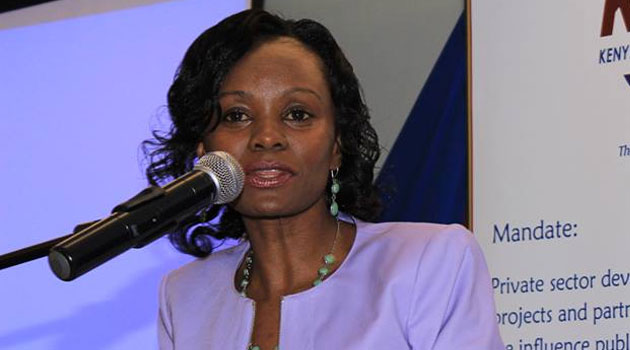NAIROBI, Kenya, May 28 – Members of the Kenya Private Sector Alliance (KEPSA) have called on the government to gradually and partially re-open the economy to preserve the economy and support health response.
Speaking during a virtual meeting with the government through the office of the National Development Implementation and Communication Cabinet Committee (NDICCC), chaired by Dr. Fred Matiang’i, KEPSA Chief Executive Carole Karuga reiterated that COVID-19 is the new normal and every effort must be made to ensure there is continued economic activity in the country while upholding measures to safeguard the health of its people.
“Coronavirus is the new global reality. We are working hard to protect our people and curb the spread whilst, getting the economy on a recovery path through ensuring both formal and informal sectors resume to normalcy,” Carole Karuga said. “The Government and the private sector can develop a practical recovery strategy that balances health, economic, and societal needs respectively.”
On his part, Dr. Matiang’i said that the public and private sectors should explore ways to deal with the reality of COVID-19.
“This is a shared responsibility and a comprehensive recovery plan will be rolled out, which includes the eight-plan stimulus package recently announced by President Uhuru Kenyatta, as well as the Private Sector’s interventions that are geared towards keeping our economy going,” Dr. Matiang’i said.
“All the proposals presented by KEPSA will be consolidated into a white paper of private sector protocols as government considers easing containment measures,” Dr. Matiang’i said. Adding that: “Where there are gaps, it is imperative to address them now as the government is working on the 2020/2021 budget that will incorporate the CRP.”
Dr. Matiang’i also confirmed that the National Treasury has handed over Sh10 billion to the Kenya Revenue Authority (KRA) for the VAT Refund.
The CS, however, warned about a rush opening saying that other economies that have recently re-opened have witnessed a spike in infection rates.
KEPSA recommended a phased opening of the economy, starting with the reduction of the curfew hours for non-essential services and sectors including retail sectors. This measure will allow for more economic activity and workforce productivity – particularly our micro, small and medium enterprises.
“The unprecedented scale of the pandemic means that the return to work will need to be gradual and phased, and heightened caution is necessary to prevent further waves of infection. It is also important to ensure that the burden of COVID-19 prevention is not placed disproportionately on SMEs, who are already struggling to stay in business,” KEPSA Chairman Nik Nesbitt said.
The proposed restrictions to be eased, in order to promote economic activity, include re-opening of government offices that are either closed or at limited capacity, especially the Land registry and the Judiciary to continue serving essential government services to businesses.
It also includes reviewing the curfew hours to begin at 9.00 p.m. and gradually review it as time goes, with eventual lifting of the curfew, as appropriate.
There is also re-assessing and reviewing the inter-county travel ban to, among other, allow farmers to travel between counties to sell produce and livestock and allow technicians and managers to travel outside Nairobi/Mombasa to farms and factory sites.
KEPSA also wants the re-opening of livestock and produce markets that had been closed with clear appropriate protocols.
“Getting ahead of the coronavirus is not solely the responsibility of the government, and the private sector has demonstrated that understanding. They have been agile to expand manufacturing capacity and shift supply chains to meet the increasing needs for the Personal Protective Equipment (PPE),” Karuga said.
On her part, the Deputy Chief of Staff, Policy and Strategy at State House Dr. Ruth Kagia said that as we begin to think on how to move forward, there is a need to align the stimulus package to all the vulnerable segments including women-owned enterprises. She also appealed to the private sector to accelerate the changes in the post-COVID-19 era.
“The private sector is going to be the driver of the recovery process. The government will continue engaging the business community on the post-COVID-19 recovery and working with the key sectors like the construction sector to create more public works programmes, and SMEs to strengthen and expand local production,” Dr. Kagia said.
The Trade and Industrialization Cabinet Secretary Betty Maina presented a raft of proposed guidelines that businesses will have to adopt and enforce when they re-open their businesses.
“These standard operating procedures will be unique to every work environment. And will help us to balance safe operations of businesses and minimization of infections,” CS Maina said.
With regards to when and how to reopen the economy, KEPSA has outlined a set of working principles for recovery. These three principles include guidance on government’s plans in order to scenario plan; adopt a unique Kenyan strategy while leveraging global benchmarks and best practices; and a practical restart strategy that balances health, economic, and societal needs.
To contain a new wave of infection, KEPSA recommends for the government to provide information with Standard Operating Procedures for employees to follow as a means of ensuring safe work conditions. On the other hand, KEPSA places responsibility on the private sector to initiate workplace measures and protocols to maintain safety.
The Chief Administrative Secretary in the Ministry of Health Dr. Mercy Mwangangi said that we need to see the silver lining and leverage on the opportunities this crisis has presented.
“The health sector has been working well with the private sector and will continue prioritizing local manufacturers for provision of the medical equipment,” Dr. Mwangangi said.
The private sector also reaffirmed its commitment to the Government’s efforts to curb and contain the disease through observing social distancing, the wearing of masks, and practicing proper hygiene.
“We encourage the public to continue to play its part in preventing the spread of the virus as we advance the efforts and conversations on the opening of the economy,” Karuga concluded.












































